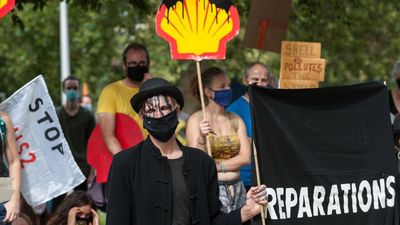Activists Want Shell to Take Responsibility for Damage to Nigerian Communities Amid Sale Announcement
The British oil giant’s almost 100 years of operations in Nigeria have been marked by environmental degradation, violence, and loss of livelihood in communities across the Niger Delta.
Environmental activists are calling on the Nigerian government to hold the Nigerian branch of Shell accountable. “[The government should] not allow (Shell Nigeria) go away without taking responsibility for its damages,” Goodness Dickson, team lead at Eco Clean Active Initiative tells OkayAfrica, after the British oil giant announced the sale of its onshore business in the Niger Delta region of the country.
“[The sale] is not a surprise, looking at the damages and havoc done in the Niger Delta region and the widespread campaign by climate activists on the phasing out of fossil fuel across the globe,” Dickson said.
Shell, who has been conducting business in Nigeria since the 1930s, has been attempting to sell its Nigerian subsidiary since 2021. It has now reached agreements with five predominantly local companies at a purchase price of $2.4 billion.
Shell is one of many international oil companies attempting to leave the region, after nearly 100 years of controversy surrounding the environmental and social offenses made against the communities in the area. In the last two years, ExxonMobil, Eni, Equinor, and Addax, have sold their onshore assets in Nigeria too, largely due to the overwhelming issues faced in the region including environmental damage, oil theft, and violence against communities.
In 2022, the Dutch division of the environmental organization Friends of the Earth, filed a suit against Shell for the multiple oil pipeline leaks that occurred in the Niger Delta over their time working in the area. The company was ordered to pay close to $16 million – close to 7 billion Naira – in damages to the affected communities in the Ikot Ada Udo, Oruma, and Goi areas that dealt with major oil spills between 2004 and 2007.
Decades of environmental tragedies
Crude oil was first discovered underneath Nigerian soil in 1956. According to its site, Shell is Nigeria’s oldest energy company, having landed in the country in 1938 but only producing the first commercial oil exports in 1958. The British oil company has boasted having the “largest footprint of all the international oil and gas companies operating” in Nigeria over the past 66 years.
The case brought against the oil company in 2022 was initiated by four farmers, alongside Friends of the Earth, as they suffered a loss of income due to the company’s efforts contaminating the land and water that their livelihoods depended on.
According to Dickson, the European company’s move to unburden themselves from dealing with the onslaught of environmental opposition to fossil fuels is an attempt to “escape the consequences of their actions – both the harm inflicted upon people and the environment.”
“Their aim is to avoid paying compensation or facing justice for their actions within the community," said Dickson. "They are seeking for buyers to assume the responsibility of dealing with spills, theft, and sabotage. They have been confronted with numerous lawsuits seeking compensation for the damage caused by spills in the Niger Delta. Despite the profits of billions of dollars yearly, they are less concerned about the impact of damages in the region. Therefore, the government should not allow them to go away without taking responsibility for its damages."
Executive director of the Nigerian advocacy group Health of Mother Earth Foundation, Nnimmo Bassey, echoes these sentiments. “Shell must own up to its responsibility," Bassey said in a statement to Reuters. "This means full payment for the remediation and restoration of the polluted areas as well as reparations to the host communities. They cannot walk away from the virtually irreparable harm they have caused.”
The consortium intending to acquire Shell Nigeria’s onshore business is known as Renaissance and is made up of Switzerland-based Petrolin, and Nigerian oil producers ND Western, Aradel Holdings, First E&P, and Waltersmith. The sale, however, cannot go through without the approval of the Nigerian government – which owns 55 percent of the business through the state-owned Nigerian National Petroleum Corporation.
- Interview: How Climate Change is Bringing Deadly Cyclones to East Africa ›
- Dying Lagoons Reveal Mexico’s Environmental Racism ›
- Nigeria Triumphs in Appeal Against $11B Damages in P&ID Gas Deal ›
- Why There Are No Easy Answers to Nigeria’s Ongoing Fuel Scarcity Crisis - Okayplayer ›
